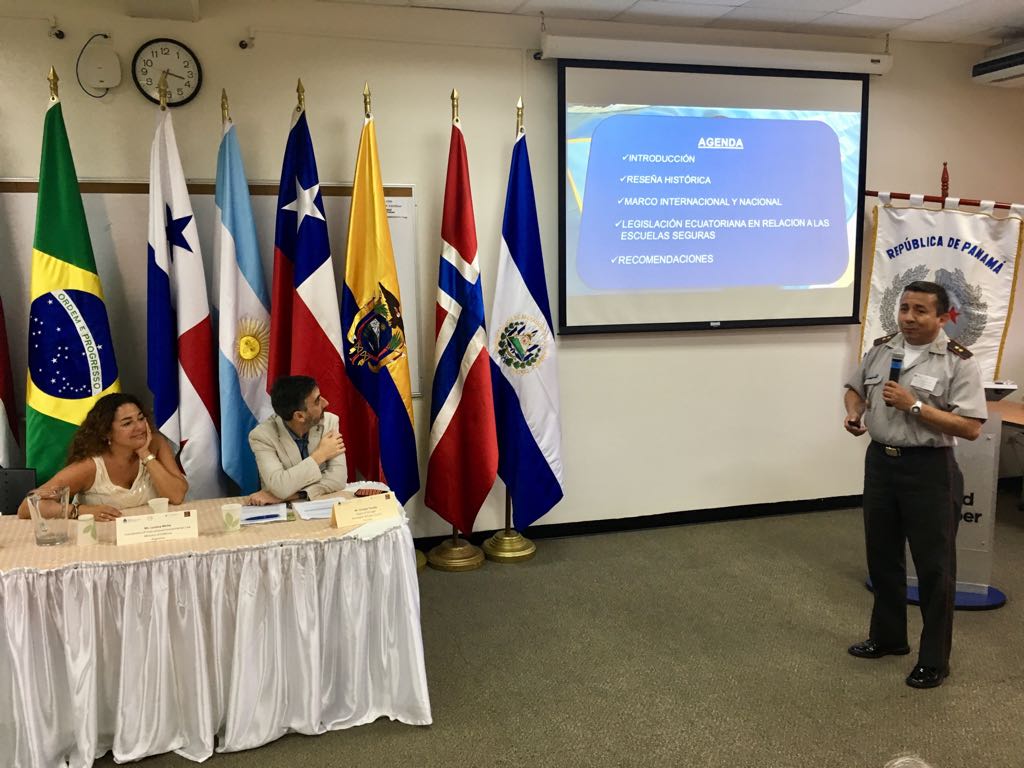GCPEA News
Ten Latin American Countries Convene to Protect Education
GCPEA PRESS RELEASE, December 6, 2017
(December 6, 2017 – Panama City) Representatives from the ministries of defense, foreign affairs, public security, and national armed forces of 10 Latin American states met in Panama City on December 5-6, to discuss how to protect students, teachers, and schools from attack, and schools from military use, in wars around the world. All 10 countries have endorsed the Safe Schools Declaration, a political commitment developed by the governments of Norway and Argentina.
The workshop was hosted by the governments of Panama, Argentina, and Norway, and the Global Coalition to Protect Education from Attack (GCPEA).
“The Safe Schools Declaration provides a very useful framework for the discussion of important issues that impede the delivery of education in conflict zones around the world,” said Diya Nijhowne, GCPEA director. “Over the last two days, the experts that participated in this workshop shared examples of good practice and explored innovative ways to better protect students, teachers, schools, and universities from the worst effects of war.”
Together with regional and international peacekeeping and education experts, state representatives exchanged practices and experience regarding the protection of schools and universities during armed conflict. Participants in the workshop discussed ways in which their governments can meet the commitments made in the Safe Schools Declaration and, in particular, implement explicit protections for schools from being used for military purposes during wartime into relevant domestic policies and operational frameworks.
In the majority of armed conflicts around the world, schools and other education infrastructure are taken over by armed forces and armed groups to be used in support of their military operations. Using a school building as a base, barracks, weapons cache, or firing position can turn it into a target of attack. When children attend school alongside soldiers, they may be exposed to a range of risks, including the possibility of death, injury, psychological trauma, child recruitment, or sexual abuse. Girls are often disproportionately affected, as their parents may be particularly wary of sending them to school when there is a risk of violence. GCPEA has found that military use of educational infrastructure has occurred in at least 28 countries around the world since 2013, including Colombia and many countries where Latin American forces are deployed as peacekeepers.
During the workshop, the International Committee of the Red Cross shared details of its practical experience in preventing and responding to attacks on educational facilities. The United Nations Department of Peacekeeping Operations outlined the protection of education in peacekeeping operations, and shared advice on how different stakeholders – both civilian and military – can work together to protect schools and universities from attack and prevent their use for military purposes. Geneva Call discussed its work with armed non-state actors to increase their awareness of the importance of protecting education and avoiding military use of schools.
Representatives of the Office of the Special Representative of the Secretary-General on Children and Armed Conflict and the Global Education Cluster spoke about the importance of monitoring and reporting attacks on education and how their organizations contribute to this work. Lively discussions of the challenges to education that occur in situations of armed conflict were moderated by representatives of the United Nations Office for the Coordination of Humanitarian Affairs, Save the Children, the Norwegian Refugee Council, and the Ministry of Defense of El Salvador.
The event also featured a discussion and analysis led by Darin Reeves, Director of Training of the Roméo Dallaire Child Soldiers Initiative, of a toolkit to guide understanding and implementation of the Guidelines for Protecting Schools and Universities from Military use during Armed Conflict, which was developed through a partnership between GCPEA and the Dallaire Initiative. The toolkit contains guidance and sample generic instruments that can help states to strengthen trainings and practices on the protection of educational facilities from military use and attack.
In addition, Laura Perez, UNICEF Advocacy and Policy Specialist, introduced participants to the recently launched The Safe Schools Declaration: A Framework for Action, a GCPEA document that provides governments with suggestions, recommendations, and examples of good practice to assist them in implementing the commitments contained within the Declaration.
Latin American countries are significant contributors of police, military experts, and troops to UN peacekeeping operations, among them nine of the countries that have endorsed the Declaration: Argentina, Brazil, Chile, Costa Rica, Ecuador, El Salvador, Honduras, Paraguay, and Uruguay.
El Salvador recently became the 71st country to endorse the Safe Schools Declaration.





